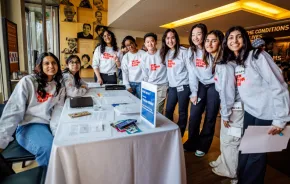
It’s not your imagination: Your tween’s friendships have gotten trickier and that can mean major drama at home. Middle school drama is inevitable but during these pandemic times, it can feel even more overwhelming.
The middle school years create the perfect storm of changes, says teen life coach Sheri Gazitt.
“Relationships can get messy as everyone rides their own roller coaster of changes,” says Gazitt, the founder of the Seattle organization Teen Wise.
“It’s not only that many kids attend new schools,” she adds. “The pace of puberty varies drastically [with] interests changing and emotions running higher as the brain’s amygdala takes over.”
Brain science
Understanding the teen brain can help explain why a single lunch room incident can feel like a tsunami to your child.
“Kids begin to develop self-awareness and metacognition. They recognize how they relate to the world while also seeing how they are perceived by others,” Gazitt says. The result? “Hyper-awareness about social circles and social hierarchies.”
Not helping is the fact that your child’s emotion center (the amygdala) is often in control.
“An emotional interpretation of events is entirely different than a logical interpretation. It leads to more intense experiences, more emotional reactions and more confusion,” says Gazitt.
The part puberty plays
And it’s not only the brain: Everyone develops at their own pace physically, too.
“Kids who hit puberty first will begin to see the world in a different light. This can lead to changes in behavior, interests, philosophies, values and maturity between fifth and eighth grade.”
Such radical change can mean big changes for friendships. Some kids abruptly discard friends while others hang onto friendships that no longer serve them, Gazitt says.
Imagine this
To better understand what this all means, imagine a lunch room packed with kids.
Your child sees their best friend sit at a new table — without them. Rationally, there could be any number of reasons why this happened. Emotionally? Not so much.
“When your daughter says, ‘Today, Katie completely ignored me at lunch,’ try not to say, ‘I can’t believe she did this to you!’ or ‘You should just talk to her,’” says Gazitt.
Instead, try problem solving with your child. Ask: "How do you feel? Why do you think Katie ignored you? Are you gals going through something? What do you think tomorrow will be like?"
Empathizing with your child’s emotions often means getting a handle on your own. Gazitt says kids tell her that sometimes, they avoid telling theirs parents things because they know they’ll blow them out of proportion.
“Our kids are already hyper-emotional, so it’s our job to keep calm,” says Gazitt. “Be that stable rock in the raging river. Don’t jump in with them.”
For example, if your kid tells you someone said their outfit is ugly, first ask why they think someone would say that. Then, help your child come up with responses for next time.
“Ask them what would happen if they said, ‘Oh, yeah! Thanks!’ or ‘I like it’ and then walked away,” says Gazitt, who adds that parents need to be mindful that mean behavior is different than bullying.
Best advice: Stay on the sidelines
If parenting is a soccer game, imagine these years as a good time to get off the field.
“The best way to support our kids though friendship drama is to be on the sidelines coaching them instead of being in the middle of the field,” Gazitt says. “Ultimately, they have to put in the work. It’s their life.”
Editor’s note: This article was originally published in 2018, and updated in October 2021.











